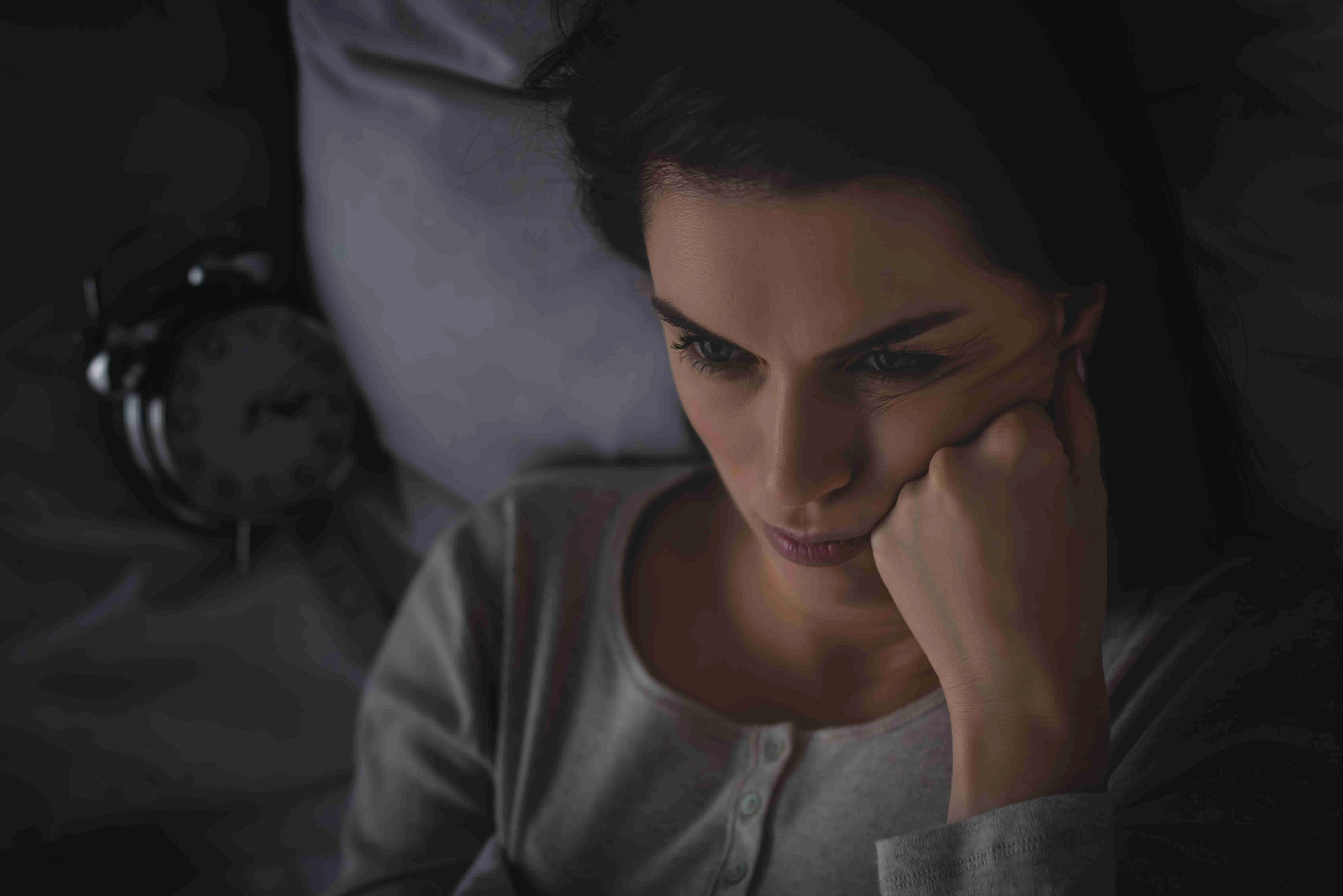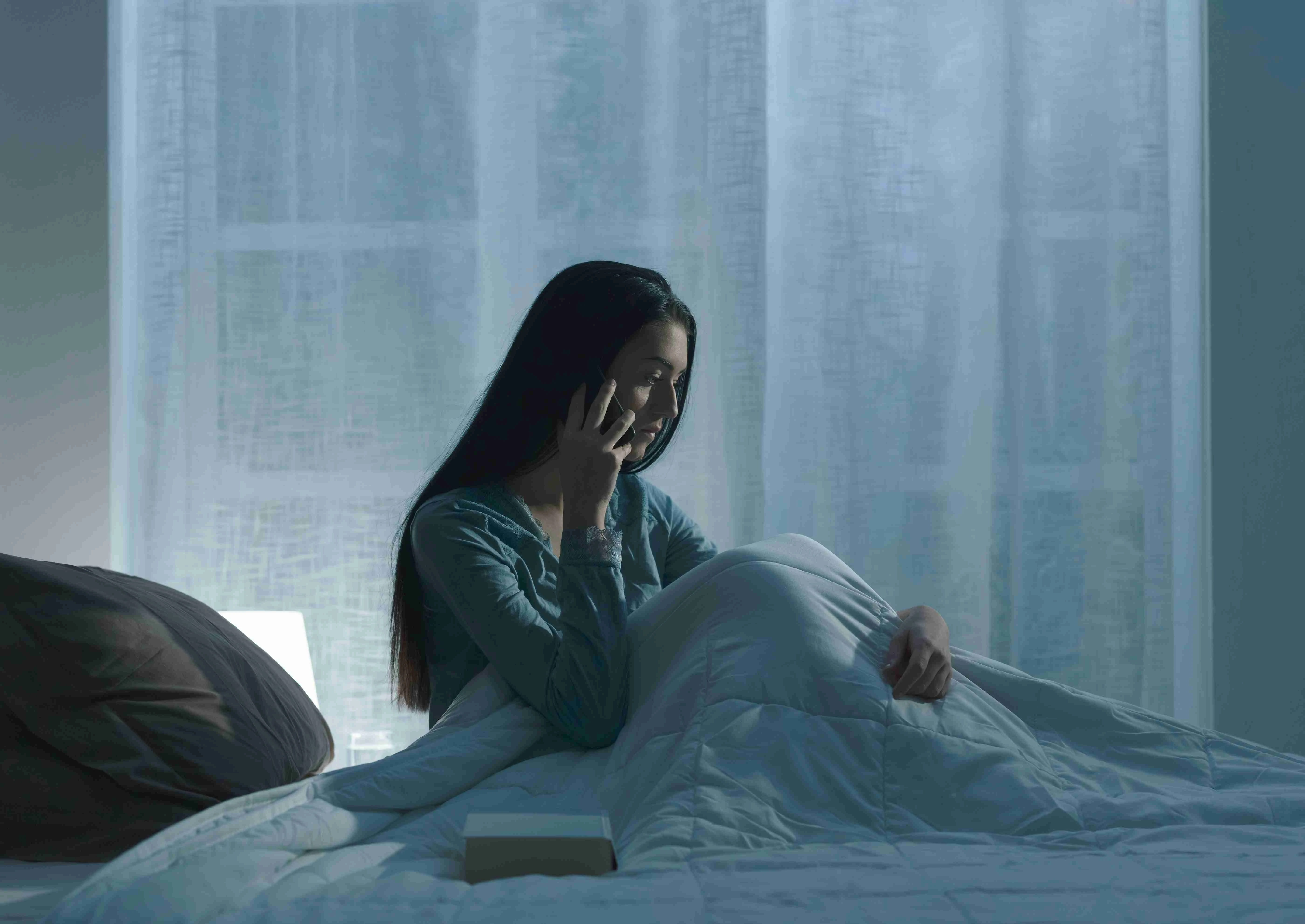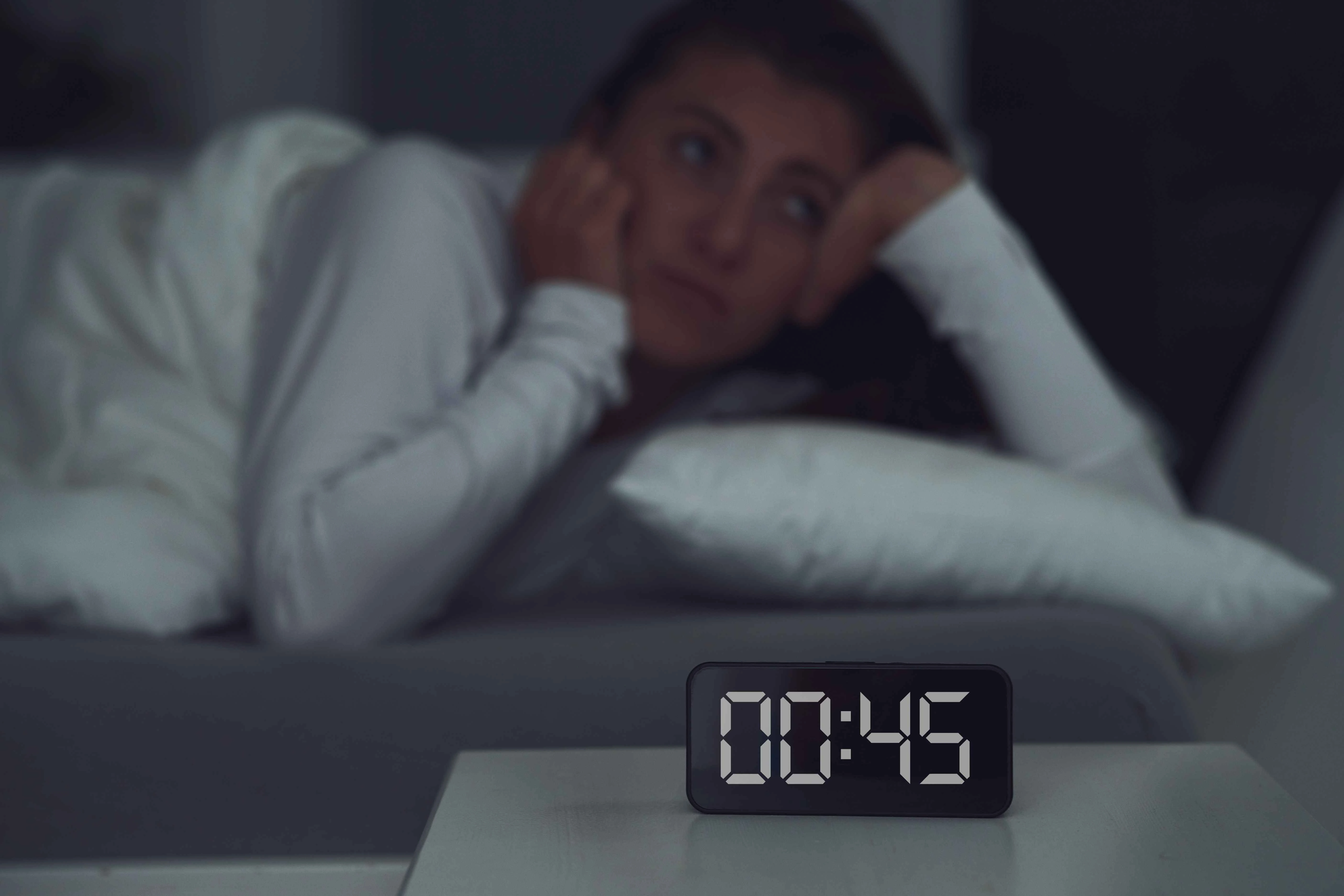Insomnia, a common sleep disorder affecting millions worldwide, can have a profound impact on both physical and mental well-being.
Understanding insomnia's symptoms is critical for early detection and effective management. In this article, we'll explore the various signs that may indicate you're dealing with insomnia, from nighttime struggles to daytime consequences.
What is Insomnia?
Insomnia definition is a sleep disorder that affects your ability to fall asleep, stay asleep, or experience refreshing sleep.
It can manifest in various forms, ranging from occasional bouts of sleeplessness to chronic, persistent sleep disturbances.
Insomnia can significantly impact your daily functioning, leaving you feeling fatigued, irritable, and unable to concentrate.
Types of Insomnia

Insomnia can be classified into different types based on its duration and underlying causes:
Acute Insomnia
Acute insomnia is a short-term sleep disturbance that typically lasts for a few days or weeks. It can be triggered by temporary life stressors such as work-related pressures, family issues, or environmental changes.
Chronic Insomnia
Chronic insomnia is a persistent sleep disorder that lasts for at least three nights per week for three months or longer. It can have a significant impact on your daily life and overall well-being.
Comorbid Insomnia
Comorbid insomnia refers to sleep disturbances that occur alongside other medical or psychiatric conditions, such as depression, anxiety disorders, or chronic pain.
Onset Insomnia
Onset insomnia is characterized by difficulty falling asleep at the beginning of the night. This type of insomnia can be particularly frustrating and lead to feelings of restlessness and anxiety.
Maintenance Insomnia
Maintenance insomnia involves the inability to stay asleep throughout the night, often resulting in multiple awakenings and difficulty returning to sleep.
Learn more about the Different Types of Insomnia.
Causes of Insomnia

Insomnia can arise from various underlying factors, including physical, psychological, and environmental causes. Understanding the potential causes can help you identify and address the root of your sleep disturbances.
Physical Causes
- Medical Conditions: Certain medical conditions can significantly impact sleep quality. Chronic pain, respiratory issues, and gastrointestinal problems are common culprits that may interfere with restful sleep.
- Medication: Medication side effects can sometimes lead to insomnia. Certain antidepressants, blood pressure medications, and stimulants may disrupt normal sleep patterns as an unintended consequence.
- Hormonal Imbalances: Hormonal imbalance often plays a role in sleep disturbances. Thyroid disorders, menopause, and pregnancy-related hormonal fluctuations can all contribute to difficulty sleeping.
- Sleep Disorders: Some sleep disorders, such as narcolepsy or circadian rhythm disorders, can directly impact one's ability to maintain a regular sleep schedule.
- Sleep Apnea: Sleep apnea is characterized by pauses in breathing during sleep and can lead to frequent awakenings and poor sleep quality.
- Restless Leg Syndrome: RLS causes an irresistible urge to move the legs, often accompanied by uncomfortable sensations that can make falling asleep challenging.
Psychological Causes
- Stress and Anxiety: Stress and anxiety are common contributors to insomnia. Racing thoughts and worry can make it difficult to relax and fall asleep.
- Depression: Depression often coexists with sleep problems. Changes in sleep patterns, including insomnia, are a common symptom of depressive disorders.
- Trauma: Emotional distress and trauma can lead to hypervigilance and difficulty relaxing, both of which can interfere with sleep.
Environmental Causes
- Noise Pollution: Noise pollution from traffic, neighbors, or other sources can disrupt sleep and make it hard to fall or stay asleep.
- Sleeping Environment: An uncomfortable sleeping environment, including factors like room temperature, mattress quality, or lighting, can significantly impact sleep quality.
- Irregular Sleep Schedules: Sleep schedules, often due to shift work or frequent travel, can disrupt the body's natural circadian rhythm and lead to insomnia.
Learn more about the Causes of Insomnia.
Symptoms of Sleep Insomnia
Insomnia can present itself in different ways, and recognizing its symptoms is crucial for seeking appropriate treatment. Here are some of the most common symptoms of insomnia:
Difficulty Falling Asleep
One of the hallmark symptoms of insomnia is trouble initiating sleep. People with this symptom often find themselves lying in bed for extended periods, unable to drift off despite feeling tired.
This can lead to frustration and anxiety about sleep, potentially exacerbating the problem.
Frequent Waking During the Night
Many individuals with insomnia experience fragmented sleep, where they wake up multiple times throughout the night.
These awakenings can be brief or prolonged, but they often disrupt the normal sleep cycle and prevent restorative deep sleep.
Waking Up Too Early
Early morning awakenings are another common symptom of insomnia. This involves waking up much earlier than desired or necessary and being unable to fall back asleep. This can result in insufficient total sleep time and feelings of exhaustion upon waking.
Daytime Fatigue and Sleepiness
The cumulative effect of poor sleep quality or insufficient sleep duration often manifests as daytime fatigue and excessive sleepiness. This can impact daily functioning, leading to decreased productivity, difficulty concentrating, and mood disturbances.
Additional common symptoms of insomnia may include:
- Non-restorative Sleep: Non-restorative sleep is feeling unrefreshed upon waking, even after spending an adequate amount of time in bed.
- Irritability and Mood Changes: Lack of quality sleep can lead to increased irritability, mood swings, and a decreased ability to cope with stress.
- Cognitive Impairment: Insomnia can affect memory, attention, and decision-making abilities.
- Physical Symptoms: Headaches, muscle tension, and gastrointestinal issues can sometimes accompany chronic insomnia.
- Anxiety about Sleep: As sleep problems persist, many individuals develop anxiety about their ability to sleep, which can create a cycle of worry that further interferes with sleep.
Daytime Symptoms of Insomnia
Insomnia doesn't just affect nighttime sleep; it can have significant impacts during the day as well. Here are some common daytime symptoms experienced by individuals suffering from insomnia:
Persistent Fatigue
Chronic insomnia often leads to persistent morning fatigue. This isn't just feeling tired; it's a deep-seated exhaustion that can affect every aspect of daily life.
People with insomnia-related fatigue may feel physically and mentally drained, struggling to muster energy for routine tasks.
Difficulty Concentrating
Lack of quality sleep can significantly impair cognitive function. Those suffering from insomnia often report trouble focusing on tasks, whether at work or in their personal lives.
This difficulty in concentrating can manifest as an inability to follow conversations, complete complex tasks, or maintain attention for extended periods.
Irritability or Mood Swings
Sleep deprivation can have a profound impact on emotional regulation. Insomnia sufferers may find themselves more easily frustrated, quick to anger, or experiencing rapid mood changes throughout the day. This emotional volatility can strain relationships and impact overall quality of life.
Forgetfulness
Adequate sleep is crucial for memory consolidation and cognitive function. Insomnia can lead to both short-term and long-term memory issues.
People may struggle to remember recent events, appointments, or important information, affecting their personal and professional lives.
Increased Anxiety or Stress levels
Insomnia and anxiety often form a vicious cycle. Lack of sleep can heighten anxiety levels, while increased anxiety can make it harder to fall asleep.
This can result in a constant state of worry or tension, making it difficult to relax even during waking hours.
Feeling Drowsy
Despite the inability to sleep well at night, individuals with insomnia may experience excessive daytime sleepiness.
This drowsiness can be particularly dangerous when driving or operating machinery, increasing the risk of accidents. It can also lead to unintended naps during the day, further disrupting the sleep-wake cycle.
Physical Symptoms of Insomnia
Insomnia can manifest in various physical symptoms, affecting the body in multiple ways. Here are some common physical symptoms associated with insomnia:
Headaches
Insomnia can often lead to frequent headaches or migraines. The lack of restorative sleep affects the body's pain regulation systems, making individuals more susceptible to head pain.
These headaches may range from dull, persistent aches to more severe, throbbing sensations.
Muscle Tension
Sleep deprivation can cause increased muscle tension throughout the body. People with insomnia might experience stiffness, particularly in the neck, shoulders, and back. This tension can lead to discomfort and may even contribute to chronic pain conditions over time.
Gastrointestinal Issues
The relationship between sleep and digestive health is complex. Insomnia can exacerbate gastrointestinal problems, leading to symptoms such as stomach pain, bloating, constipation, or diarrhea.
The disruption of the body's natural circadian rhythm can affect digestive processes and gut health.
Increased Heart Rate or Palpitations
Sleep plays a crucial role in regulating cardiovascular function. People with insomnia may notice an increased heart rate or experience heart palpitations, especially when trying to fall asleep. This can be due to the body's heightened state of alertness and the disruption of normal sleep-wake cycles.
Dry Mouth
Insomnia can lead to dry mouth, either directly or as a side effect of medications used to treat sleep disorders. This can cause discomfort and increased thirst and potentially contribute to dental issues if persistent.
Weight Fluctuations
Chronic sleep deprivation can impact metabolism and hormonal balance, potentially leading to weight changes.
Some individuals with insomnia may experience weight gain due to increased appetite and cravings for high-calorie foods, while others might lose weight due to changes in metabolism or reduced appetite.
Risk Factors for Insomnia
While insomnia can affect anyone, certain factors may increase your risk of developing this sleep disorder:
Stress and Anxiety disorders
Stress and anxiety are major contributors to insomnia. Chronic stress from various life aspects can make relaxation and sleep initiation difficult.
Anxiety disorders often lead to racing thoughts and heightened alertness, interfering with sleep onset and maintenance.
Chronic medical conditions
Various medical conditions can increase insomnia risk. These include chronic pain conditions, respiratory disorders, neurological conditions, endocrine disorders, and gastrointestinal issues.
The discomfort or symptoms associated with these conditions can directly interfere with sleep or lead to sleep-disrupting behaviors.
Substance Abuse
Substance use and abuse significantly impact sleep patterns. Alcohol may initially induce drowsiness but disrupt sleep cycles. Caffeine, a stimulant, can make falling asleep difficult, especially when consumed later in the day. Nicotine can lead to difficulty falling asleep and cause sleep disturbances throughout the night.
Irregular Sleep Schedules
Disruptions to the body's natural circadian rhythm increase insomnia risk. Shift work, especially rotating or night shifts, can make maintaining a consistent sleep schedule challenging.
Travel across time zones can temporarily disrupt sleep patterns. Inconsistent sleep-wake times can confuse the body's internal clock.
Genetics and Family History
There appears to be a genetic component to insomnia. A family history of insomnia or other sleep disorders can increase one's risk. Certain genetic variations may affect sleep regulation and susceptibility to insomnia.
Insomnia Treatment

The good news is that insomnia is a treatable condition, and various approaches can help you regain restful sleep. Here are some common ways of how to cure insomnia if you have trouble sleeping:
Cognitive Behavioral Therapy
Cognitive Behavioral Therapy for Insomnia (CBT-I) is a highly effective and recommended treatment approach. It involves identifying and modifying negative thought patterns and behaviors that contribute to sleep disturbances.
CBT-I may include techniques such as sleep restriction, stimulus control, and relaxation strategies.
Sleep Restriction Therapy (SRT)
Sleep Restriction Therapy (SRT) is a behavioral treatment used to improve sleep quality by limiting the amount of time spent in bed to match the actual time spent sleeping.
This method aims to consolidate sleep and reduce the time spent awake in bed, thereby improving overall sleep efficiency.
Medications
For some cases of severe insomnia, your healthcare provider may recommend sleep medications to help manage insomnia if you can't fall asleep. These can include:
- Prescription Sleep Aids: In some cases, healthcare providers may recommend medications to manage insomnia if you have trouble staying asleep. Prescription sleep aids can help initiate and maintain sleep but should be used under medical supervision due to potential side effects and the risk of dependency.
- Melatonin Supplements: Melatonin supplements mimic the body's natural sleep hormone and may be helpful for some individuals, particularly those with circadian rhythm disorders.
- Antidepressants with Sedative Effects: Certain antidepressants with sedative effects can be prescribed off-label for sleep insomnia, especially when depression or anxiety are contributing factors.
Lifestyle Changes
Incorporating healthy lifestyle habits can significantly improve sleep quality and alleviate insomnia symptoms. Some effective lifestyle changes include:
- Establishing a Consistent Sleep Schedule: Establishing a consistent sleep schedule helps regulate the body's internal clock. Going to bed and waking up at the same time daily, even on weekends, can improve sleep quality.
- Sleep-friendly Environment: Creating a sleep-friendly environment involves keeping the bedroom dark, quiet, and cool. Investing in a comfortable mattress and pillows can also make a significant difference.
- Regular Physical Activity: Regular physical activity can improve sleep quality, but it's best to avoid vigorous exercise close to bedtime. Aim for at least 30 minutes of moderate exercise most days of the week.
- Limiting Caffeine, Nicotine, and Alcohol Consumption: Limiting caffeine, nicotine, and alcohol consumption, especially in the hours leading up to bedtime, can help improve sleep. These substances can interfere with sleep onset and quality.
- Practicing Relaxation Techniques: Practicing relaxation techniques such as deep breathing, progressive muscle relaxation, or meditation can help calm the mind and prepare the body for sleep.
FAQs
How much sleep do adults need?
Most adults need between 7-9 hours of sleep per night for optimal health and functioning. However, individual sleep needs may vary.
Is it normal to wake up during the night?
It is normal to experience brief awakenings during the night, but if you have difficulty falling back asleep, it could be a sign of insomnia.
Can insomnia be cured?
While insomnia may not have a definitive cure, it can be effectively managed and treated through various approaches, such as cognitive behavioral therapy, lifestyle changes, and medications (if necessary).
Is it safe to take sleeping pills long-term?
Long-term use of sleeping pills is generally not recommended due to the potential for dependence and side effects. It's best to use them only for short periods under medical supervision and in combination with other non-pharmacological treatments.
Can insomnia be prevented?
While insomnia cannot always be prevented, maintaining good sleep hygiene practices, managing stress, and addressing underlying medical or psychological conditions can help reduce the risk of developing insomnia.
Why can't I sleep at night even when I'm tired?
Difficulty sleeping at night, even when tired, can be caused by factors such as stress, anxiety, or overthinking. Other common reasons include poor sleep hygiene, exposure to screens before bed, caffeine or stimulants, an irregular sleep schedule, or underlying conditions like insomnia, sleep apnea, or restless legs syndrome.
How do I deal with insomnia?
To deal with insomnia, practice good sleep hygiene: maintain a consistent sleep schedule, create a relaxing bedtime routine, and avoid screens, caffeine, or heavy meals before bed. Manage stress through relaxation techniques like meditation or deep breathing.
Conclusion
Recognizing the symptoms of insomnia is the first step towards reclaiming restful nights and energized days. While occasional sleep troubles are normal, persistent symptoms warrant attention and possibly professional help.
Remember, insomnia is not just a nighttime issue, its effects ripple through every aspect of daily life.
Jessica H.
Jessica is a reviewer, writer, and sleep enthusiast at Sleepiverse. Jessica graduated with her master's degree in Nursing research and education. She is a registered nurse and currently works in the Intensive Care Unit. Since becoming a nurse, Jessica has worked the night shift, which means a disrupted sleep schedule. Knowing she needed to function at her best while caring for patients at night, she spent a lot of time researching how to sleep well with a difficult schedule.


